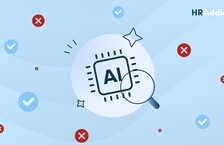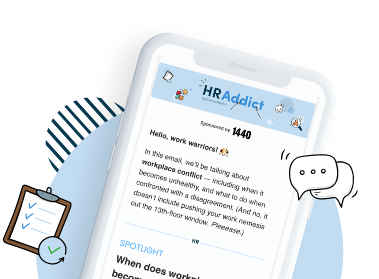This is an expert guest post by Dmytro Spilka from Solvid UK.
The emergence of AI in the HR sector is expected to grow exponentially in 2025. With more than two-thirds of companies looking to invest more in HR automation in the coming years, artificial intelligence is undoubtedly transforming the way we approach employee recruitment and management in a modern-day workplace.
However, before you invest in an automated future for your HR department, it’s essential to get familiar with the benefits of AI in HR and any potential challenges it may pose to your team.
With this in mind, we’ve gathered all the newest data about AI in HR so you don’t have to. Stick with us as we unpack the benefits and the drawbacks of AI in the HR sector and let you know whether the risk is worth the reward.
TABLE OF CONTENTS
How is AI transforming HR in 2025?
There’s no doubt that AI adoption is on the rise in the HR sector. The market size for AI in HR is expected to grow to $14.08 billion in 2029. With a 19.1% CAGR, it’s one of the fastest-growing tech advancements the sector has ever seen.
So far, we’ve seen AI redefine HR job roles in a number of ways. With the power of automation on their side, AI-infused HR teams can use the technology to streamline recruitment, re-engage remote employees, and even automate workforce planning and predictions.
Here are just a few examples of AI in HR in 2025:
- Talent acquisition and recruitment: Just under half of all organizations now use AI for recruitment and talent acquisition. With the ability to screen candidate data in seconds, AI can help HR teams narrow down top talent from large candidate pools, schedule and transcribe interviews, and communicate with potential hires.
- Onboarding new hires: After hiring, AI can streamline the onboarding process for new employees, leveraging data from their resumés and information about their roles to create personalized onboarding plans that align with their individual skills.
- Transforming performance management and retention: AI is used by HR teams to improve employee management and support worker performance. It has the ability to automate performance reviews and offers frequent feedback for improvement. Better still, it can track employee performance in real time and encourage career development based on individual strengths and weaknesses.
- Re-engaging remote employees: Did you know that 65% of employees feel more engaged when AI is used in HR processes? One of the key advantages of AI in HR is its ability to create personalized working plans for workers. In fact, AI can analyze employee data to tailor support, benefits, and learning opportunities to individual needs and preferences.
- Automated workforce planning: AI is used by HR professionals to predict future working trends and improve their decision-making. For example, AI is a master at identifying patterns in worker performance data to predict any potential issues or highlight areas for improvement.
Now that we’ve covered some of the use cases for AI in the HR sector, let’s take a look at how they can benefit HR professionals in 2025.
What are the benefits for HR professionals?
The benefits of AI in HR continue to drive the automated movement forward in businesses all across the globe.
From redefining the employee experience to promoting a better work-life balance, artificial intelligence is undoubtedly one of the most significant technological developments to hit the HR sector.
As a result, organizations are twice as agile, more productive, and built on a future-ready framework.
Here are the top six advantages of AI in HR you can delve into:
1. Enhanced employee experience
One of the first key benefits of AI in HR is its ability to enhance employee engagement. AI technology enables HR to personalize communication with individual workers and tailor development opportunities, which fosters a happier workforce as a result.
AI-powered chatbots, in particular, are brilliant knowledge bases for employees to leverage for instant access to information and support without needing to wait for answers from busy HR teams.
What's more, AI can also improve proactive engagement across teams. With the ability to monitor employee behavior metrics in real time, HR teams can identify any potential productivity dips and proactively address them ahead of time.
2. Streamlined recruitment process
Recruitment remains one of the top reasons the HR sector is investing in AI technology.
With more recruiters using AI to improve their decision-making process, it’s no wonder that more businesses are investing in automated recruitment tools.
AI streamlines recruitment, allowing HR teams to process large volumes of applications quickly. It can also automate repetitive tasks such as CV screening, candidate communication and interview scheduling, freeing up time for recruiters to focus on researching talent and ensuring the quality of their hiring pool.
3. Upskilling and employee retention
Employee retention remains one of the business sector’s most significant challenges in 2025. In iHire’s Talent Retention Report of 2024, 18.3% of employees who voluntarily resigned indicated lack of professional development as their main reason.
The introduction of AI in the workplace aims to turn poor retention on its head. AI expertly builds knowledge of a company’s job architecture based on internal and external insights. This data can then be used by HR teams to help upskill employees and help them develop within the company.
The benefits of this outweigh the costs. In edX’s 2023 survey on Navigating the Workplace in the Age of AI, 80% of employees said they’d stay longer if they’re given better training. With AI facilitating more personalized development paths, organizations can start training programs faster and at a larger scale.
4. Reduction of errors
Most HR teams are human, which means that making mistakes is an inevitable part of the job. HR teams are responsible for payroll processing, onboarding, performance management and more.
It’s common to see errors in salary calculations, tax deductions, and time-off requests, especially if your HR team is manually inputting data into the system.
AI improves error reduction in the HR sector. With the ability to automate data input and handle routine HR inquiries such as holiday requests, businesses can ensure that all data are accurate, and any errors are automatically flagged for correction.
5. Better work-life balance
It goes without saying that one of the number one advantages of AI in HR is the promise of a better work-life balance for HR professionals.
AI-powered tools allow HR teams to manage their workloads more effectively by automating repetitive tasks, optimizing schedules, and collecting real-time data to speed up decision-making.
This allows workers to streamline their focus, put high-priority tasks on top during the working day, so they can switch off during their personal time without any work-related stress.
6. Competitive advantage
The benefits of AI in HR are indubitable and could give your HR team a competitive edge in 2025.
AI streamlines all areas of the HR department. With the ability to hire smarter and faster, upskill with ease, and automate repetitive tasks to reduce clerical errors, AI builds an unbreakable foundation for your HR team, allowing your business to thrive when you go head-to-head with your competitors.
Are there any drawbacks?
While many of the benefits of AI in HR outweigh the costs, this doesn’t mean that there aren’t any drawbacks that must be considered before investing in the technology.
With this in mind, we’ve put together a guide on the challenges of AI in HR for you to familiarize yourself with if you choose to adopt AI into your HR department.
1. Potential bias and discrimination
One of the most common disadvantages of AI in HR is the risk of system bias skewing a team’s decision-making process.
AI bias is a very common challenge associated with automated technology. AI algorithms can only make predictions based on the data they are trained on. Depending on your business, this data could reflect societal biases that will impact results.
This AI bias could manifest as discriminatory hiring practices, negative performance reviews and unequal opportunities for diverse members of your workforce.
The key to overcoming this challenge is to regularly review and address biases in the data used to train the AI. It’s also recommended to diversify your input for a more accurate result. The bottom line is, AI should be used as an assistant and guide, not a decision-maker. Human input can help mitigate AI bias and ensure that a company builds a diverse, equal workforce.
2. Data privacy breaches
Another disadvantage of AI in HR to consider is the risk of a potential data breach. Like any system built on sensitive employee data, AI-powered technology is vulnerable to hacking, often leading to serious consequences for the business.
Some of these consequences include anything from damage to your reputation to serious legal penalties that result in fines and lawsuits.
A data breach that involves sensitive data such as employee bank details and addresses could also affect employee trust. Workers are more likely to lose faith in an organization if their data is misused or exposed. This could lead to a quitting spree and make it harder for HR teams to hire and retain talent after.
3. Increased dependence on technology
Last but not least, it’s essential to consider dependence on AI technology itself as a potential challenge for the HR sector.
While AI is exceptional at automating repetitive tasks and streamlining the role of an HR professional, could it be too good at their job? If AI-driven tools can recruit candidates half of the time and manage employee growth without human input, where does that leave HR professionals?
For businesses that do swap human employees for AI chatbots and CV screening systems, another challenge to consider is the lack of the human touch. Without a dedicated human team working alongside AI, organizations risk losing a crucial human connection between HR and employees that defines the purpose of the sector altogether.
The future of HR: Is AI worth the risk?
Looking to the future, it’s clear that the impact of AI in HR will continue to be enormous.
As HR teams embrace the full potential of AI, the benefits vastly outweigh the costs. While there are pros and cons to consider, automation undoubtedly improves a significant amount of HR tasks, including recruitment, onboarding, performance management, and more.
The key to mitigating the risks is to train the entire HR team to work alongside AI rather than allowing AI to do the work for them. The human touch will always be the driving factor of positive HR. So, it's essential to use AI predictions as a guide rather than a set of instructions.

